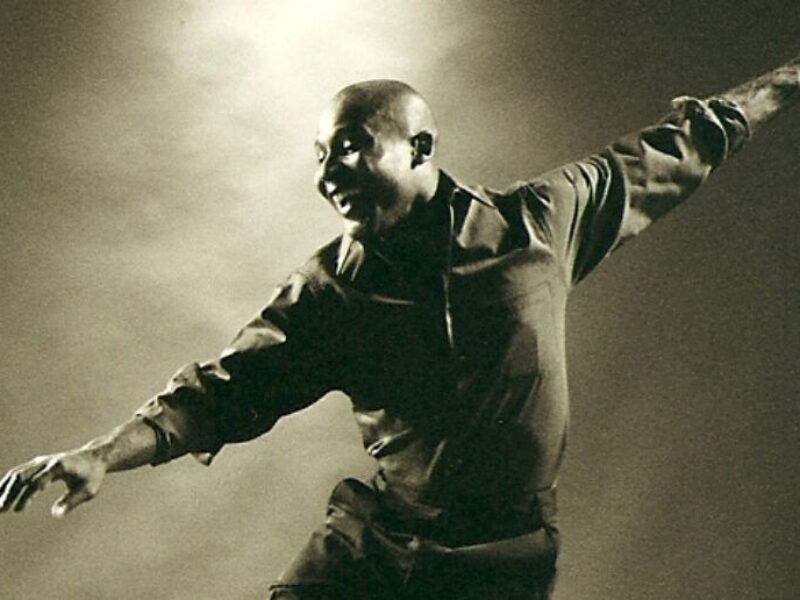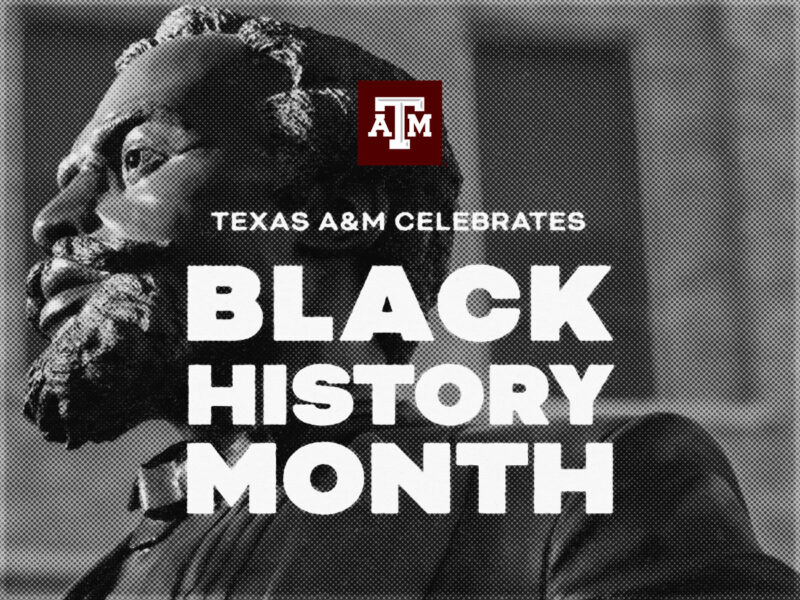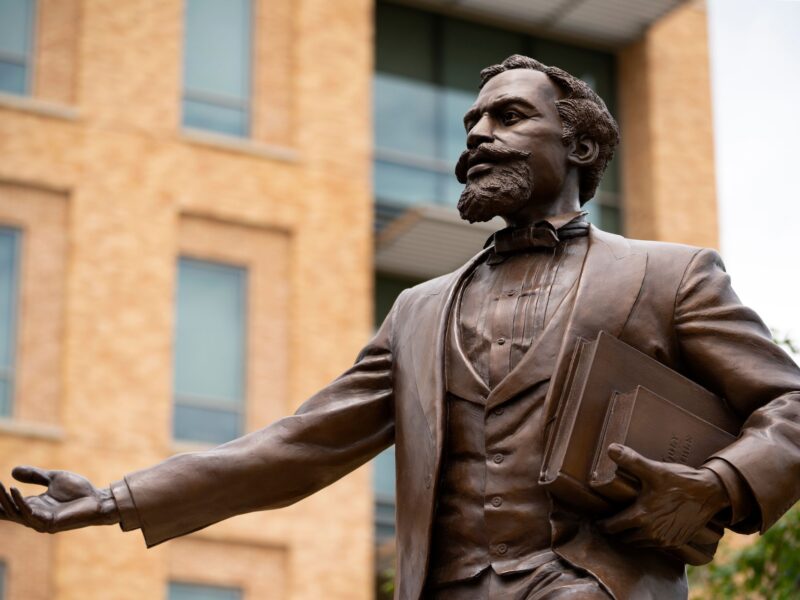Africana Studies Offers Important Lessons About The Black Experience

A global perspective, an appreciation of diversity, and strong aptitude in critical thinking and writing are just a few of the skills students can take away from Texas A&M University’s Africana Studies courses.
As the second-largest continent in the world, Africa has a large global diasporic population. It’s a significant and crucial part of the human experience, said Associate Professor of Hispanic and Africana Studies Alain Lawo-Sukam, making the presence of a strong Africana Studies program integral to the university’s role in developing a global citizenship.
“In an increasingly pluralistic society and global economy, students cannot afford to enter the workforce without a fundamental respect and understanding of people from different racial, ethnic and religious backgrounds,” he said.
It was with this goal that the program was developed by Texas A&M faculty members Albert Broussard, Finnie Coleman, Larry Yarak, Kimberly Brown and Patrick Muana, under the direction of the late Woodrow Jones Jr., who was the university’s first African-American dean.
Since 2004, the Africana Studies program has offered curriculum that provides students with an opportunity to learn about the culture, history, social contributions and experiences of people of African descent. In the time since its creation, the interdisciplinary program grew steadily for a number of years, offering courses taught by faculty members from a variety of departments and fields.
Now, the program offers 41 classes, many of which are cross-listed with courses in other departments. These courses cover Africa and the Black experience across history, anthropology, psychology, film and other fields.
For example, students can choose from courses about popular music and film in the African diaspora, Africana philosophy, post-colonial literature, black psychology, Afro-Hispanic cultures, critical race discourse, sociology of African-Americans and the rhetoric of the civil rights movement.
Lawo-Sukam served as the program coordinator since fall 2020. Lawo-Sukam said Africana Studies is an indispensable program to students of all racial, religious and ethnic backgrounds, especially during a time when the university aims to recruit and retain a more diverse academic population.
In addition, the program responds to Black students’ need to belong at Texas A&M and to educate them about their heritage, he said.
For Ryneasha Reed, a philosophy senior from San Antonio, the history she was exposed to for the first time through Africana Studies came as a shock: “I didn’t know anything about myself at all,” she said.
“I thought I already knew about the history of the African diaspora, but little did I know, I had no idea,” said Reed. “For me, it was shocking to know that all of the information I found out was kept away from me the entire time. All of this was here, and I had no idea.”
Rebecca Hankins, a Texas A&M professor and Africana Studies specialist at Cushing Memorial Library & Archives, said for many students like Reed, this is the result of Black history being obscured and minimized in Texas history courses.
From its embrace of the Confederacy to being one of the last states to free its enslaved people, Hankins said many people aren’t aware of Texas’ entwined history with the Black experience.
“It’s so important to have Africana Studies, because you need people who are willing to say, ‘Black history is all of our history,’ and in Texas, even more than people are aware of,” she said.
Juliet Mukenge, a sociology major from West Africa, said almost all of the information she learned through her Africana Studies minor was new to her. She recalls that the first Africana Studies course she took was the first time at Texas A&M that she wasn’t the only Black student in the room – and she was able to learn more about her own identity by hearing her classmates’ experiences.
“I didn’t know all of these things before coming to America,” she said. “I didn’t know that people could actually be racist over here, so it was really interesting to be in a class with people and hear them say, ‘Hey, I’ve been through that.'”
Mukenge said that while most of the students in her Africana Studies courses have been Black, her white classmates have expressed that the program helped them better understand the experiences of African Americans.
“You don’t know the extent of the struggles Black people go through until you learn all the facets that make up the culture,” she said.
While the program has provided a place of belonging for Black Aggies – who make up about 3 percent of Texas A&M’s student population of nearly 70,000 – Lawo-Sukam said students of all races can benefit from Africana Studies.
“Africana Studies is not only for Blacks. It is for everybody,” Lawo-Sukam said. “In this time, people need to understand each other, they need to know each other. If you can’t do this, it’s going to be hard for us to move forward.”
Increasing the program’s reach and visibility is one of his major goals. Toward this effort, new courses are being created to address new challenges. Once such class is “Remaking Public Memory: Racism, Embodiment and the Social/Cultural Imagination,” which will be offered this fall in response to marches and demonstrations throughout 2020 related to monuments in public spaces and the murder of George Floyd.
Hankins will co-instruct the course examining how history can be expressed through performance and visual culture alongside archival materials from Cushing Library.
“Africana Studies is trying to create a sense of learning that will not be temporary, that will show students how this connects to their personal lives, how history can move them,” she said.
Mukenge hopes to be able to refer to these lessons after she graduates in May. She aspires to attend nursing school, and said she anticipates to apply what she’s learned about being understanding of people’s different backgrounds when interacting with patients.
One lesson that stuck with her is African American sociologist W.E.B. DuBois’ concept of “double consciousness” — African Americans’ struggle of unifying Black identity and American identity.
Similarly, Reed said her minor has helped her look at the readings for her philosophy courses through a different lens. The courses also provide students tools for navigating everyday life, she said, like allowing oneself to be open to new ideas and have difficult conversations with others.
“I feel like especially on our campus right now, diving into Africana Studies would help in unifying everyone and helping with diversity on and off campus,” she said.
A minor in Africana Studies can benefit Aggies pursuing careers in business, government, education, public health, special services, communication, the creative arts, and numerous other fields, Lawo-Sukam said. He also lists a number of desirable workplace skills the program teaches: analysis, critical thinking, effective communication, collaboration, research and writing and cultural awareness.
Students also are equipped to address crucial societal issues, he said, such as equality and equity, health policy, immigration, international relations and law reform.
In an effort to grow the program, Lawo-Sukam said faculty members are presenting these benefits to academic advisors and student organizations across Texas A&M.
“The immediate goal is to not only have students take a lot of Africana courses, but also minor in Africana Studies,” he said. “From there, if we have the numbers, we will try to have a major, and then think about creating a center or a department in the long run.”
The program’s growth plays an important role in the university’s mission to increase diversity and inclusion and recruit underrepresented students, Lawo-Sukam said.
“Africana Studies is a key agent for that change,” he said.
Media contact: Caitlin Clark, caitlinclark@tamu.edu





